Nick Hakim, "Cold"
In the mode of the New New New Music Criticism, which lives exclusively in Soundcloud and YouTube comments and is actually possibly an improvement, overall: “Chills!!” Nick Hakim is very good at singing. [Via]
Andrea Dworkin, Men's Rights Advocate
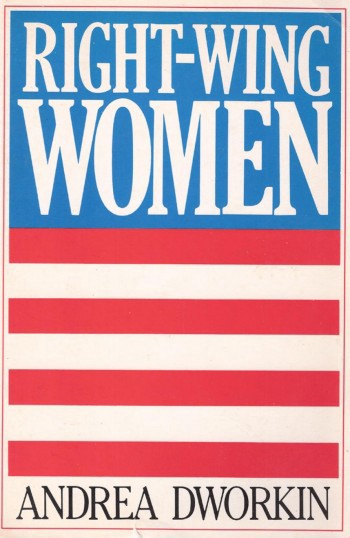
Last night I accidentally got dragged into some right-wing anti-feminist thing on Twitter about how there is a war on men because their good reputations are all besmirched when someone is accused of rape. (Oh no, if only there was some kind of system to help men defend themselves!) After I got done muting everyone involved, I decided to re-read Andrea Dworkin’s Right-Wing Women, much of which consists of her account, published in 1983, of the National Women’s Conference in Houston in 1977. (Chaired by Bella Abzug, the conference produced a National Plan of Action which… well, it didn’t go well. RIP, ERA.)
Right-Wing Women, in one MAN’S opinion, should be regarded as a foundational intersectional text; the entire argument of the book is about the relations of anti-Semitism, racism, age, poverty, sex work, welfare and hatred of gay people, all as related to hatred of women. Yet somehow it’s often not regarded as intersectional “enough.” Fine, fine. I’ll let you grad students have at it. At least we should regard it as an important historical text regarding the time that right-wing Jews and evangelicals began to collude — when a largely quite anti-Semitic group of people began to embrace Zionism. (It is also the best example of Dworkin as a reporter.)
People love to misunderstand Dworkin, often with the intention to discredit; lumped in with anti-transgender feminists, for example, when she very much was a friend to trans people. (She of course also suffered from derailing herself early and often on other topics!) But what’s also notable about her and much of her generation is that they came out of, and were involved in, the anti-war movement — a movement that doesn’t hardly exist now, even as we are locked in a state of permanent war — a state that affects some people greatly, but so many people almost not at all.
The number one criticism of feminism by men’s rights advocates (who run the gamut from mildly reasonable to total wackjobs) is that men’s bodies are treated as disposable, and that feminism doesn’t recognize this. Men are historically cannon fodder, they argue. (This is true!) But this is something that second wave feminists like Dworkin knew all about. In fact, woven throughout Right-Wing Women is a strong thread of anti-”misandry.”
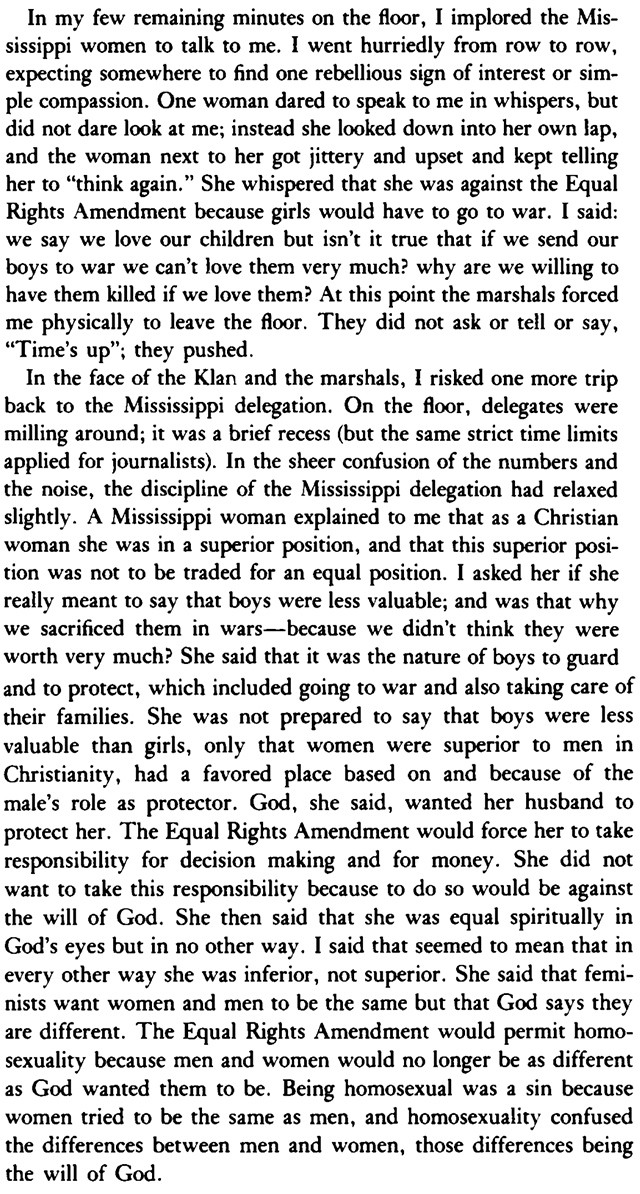
This section, in particular, picks up a thread that always itches the men’s rights fellows — where she criticizes the common idea that women are better, more spiritual, more in-touch with nature. Dworkin is pointing out here, as with the evangelical women she spoke with earlier, that she believes this is a TRAP used to trick women.
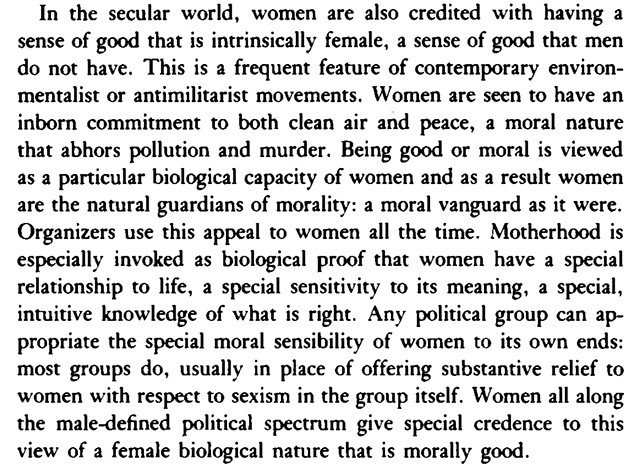
And here, near the end, she takes a hard line that many people I know would not enjoy or endorse — but many would, and the men’s rights crowd would certainly appreciate it. If the fear is that feminism somehow (IDK HOW, but okay) subjugates men, well, Dworkin’s brand of feminism is quite clearly expressed as only absolute equality, free from any bias and baloney about what a woman or man “is,” can do, or can be.
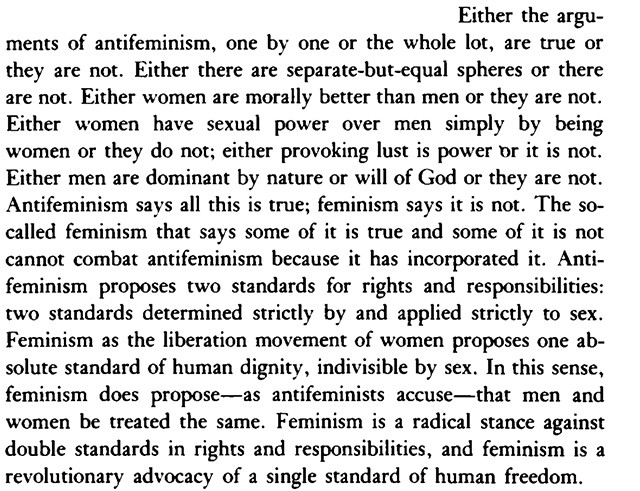
The Case Against Saying Anything At All
What if academics followed the new model of @nfergus and @nntaleb and got paid based on #controversy and #engagement?
— Prof. Jeff H Jarvis (@ProfJeffJarvis) August 12, 2014
@ProfJeffJarvis is a long-running parody account that pokes fun at media pundit Jeff Jarvis, and the broader FUTURE OF MEDIA conversation online.
@lynnlayman @ProfJeffJarvis Thanks Lynn, “prof” Jarvis commits 3 fallacies, implies shouting truth => seeking controversy, not byproduct.
— Nassim N. Taleb ن (@nntaleb) August 12, 2014
Nassim Taleb is a philosopher, statistician, and public intellectual.
.@lynnlayman @nntaleb But the question is monetization and trust. Who pays for epistemological analysis? A paywall?
— Prof. Jeff H Jarvis (@ProfJeffJarvis) August 12, 2014
@ProfJeffJarvis once posted this funny joke: “Just had a great @Lyft in Palo Alto. Driver writes for NY Times on the side. Drives a Jaguar!”
@ProfJeffJarvis @lynnlayman Prof Jarvis, BS vendors like tend to think other people are also BS vendors. #rigor, #logic, #mathematics
— Nassim N. Taleb ن (@nntaleb) August 12, 2014
Nassim Taleb wrote The Black Swan.
.@nntaleb @lynnlayman I would contend this is a post-BS world, in the sense that such distinctions no longer have traction. Only rhetoric
— Prof. Jeff H Jarvis (@ProfJeffJarvis) August 12, 2014
@ProfJeffJarvis’s bio is, “Hyperglocal thinkfluencer, Journalism 3.0 advocate. Cofounder @ Mogadishu::REinvent unconference. Investor/CIO (chief imagineer) @ NEXTIFY Labs unworkspace.”
@ProfJeffJarvis @lynnlayman You’re a fucking charlatan polluting intellectual life.
— Nassim N. Taleb ن (@nntaleb) August 12, 2014
Nassim Taleb predicted the collapse of the global economy.
.@nntaleb @lynnlayman There’s nothing poisonous about pragmatism. Need to engage with the real world of Change 2.0, not a hypothetical one.
— Prof. Jeff H Jarvis (@ProfJeffJarvis) August 12, 2014
@ProfJeffJarvis’s profile photo contains a beer helmet.
.@nntaleb Have to run to meeting but would love to have you at our unconference, Mogadishu REinvent, to discuss further?
— Prof. Jeff H Jarvis (@ProfJeffJarvis) August 12, 2014
Nassim Taleb is an expert in the field of uncertainty.
Update: The machine never sleeps.
My Short Career in the Internet Outrage Business
by Dale Eisinger

The target demographic: white males, Rust Belt, fifty-plus. We came in early; I saw the sunrise every morning. We worked in New York City, but I don’t think a single coworker lived there. They commuted from Long Island and Jersey and Philly, daily, to be in the office. I lived alone in Brooklyn and it was a straight shot on the M to Bryant Park. I could see the lawn and the library from my desk — the gold and yellow and green filtered light. I went home in the afternoon and got ready for bed before my friends clocked off, so I drank alone. I wasn’t alienated from the labor; the labor alienated me from everything else.
We made up the New York office of a conservative media company based in the South. In hindsight, the politics seem both hyper-specific and nebulous; the one constant is that they orbited around white-hot outrage and fear. This was not obvious to me when I replied to the “Digital Reporter” listing. I’d been in the business for a few years by then, writing candidly about art and music and related topics, and my track record wasn’t hard to come by: it would have been clear to anyone checking that I stood on the liberal side of things. But the earnest man conducting my interview assured me that my politics had nothing to do with the scope of the work I’d be doing. For the most part, he was correct. We’re all actors on the internet, right?
“Fuck it,” I said to myself, “You’ll have a job writing news.” Which is not to be confused with breaking news (getting a tip, making the wire) or reporting news (collecting a first-hand account) or making news happen (punching someone at a wedding). I was writing the news, over and over and over again. Some people call this aggregating or blogging; I called it a job. My necessary skillset was narrow.
The War on Christmas was a big topic around the office. When the shooting at Sandy Hook happened, the answer was “more guns.” These were positions I was not used to hearing directly. Not that I hadn’t worked at news organizations with conservatives before. This was just so clear cut, and an orthodoxy: To assign pitched outrage to mundane news items for the sake of clicks. That was the job: to trawl Twitter, and the rest of the internet, for conspiracy and evidence of liberal malice. Then, to repackage these stories or posts or memes for the target demo. This is a common job description for a certain large — and largely invisible — class of web writer. And it is tedious, mind-numbing work.
“Your career will be over,” my friend Sam told me. I considered this as my unemployment shrank.
At that point, it seemed pretty much over anyway. But no matter: My request for a pseudonym, which I did not expected to be granted, was. This was a staggering development. The speed at which the “yes” came back was unnerving, as if such requests were common. Sam and I conferred for a good hour before he drummed up a loose and purposefully Arabic-sounding anagram of my name. The next email came back even quicker than the first: “Are you an embed from Gawker?” Not that I hadn’t considered, before signing on, that I could spill the company’s secrets to the liberal media. It’s just that, it turns out, there weren’t really any secrets to spill. One time I found a couple massive portraits of Ronald Reagan in a coat closet. Otherwise, everything you needed to know was right there on the page.
“That name is too hard to catalog in the CMS,” my editor eventually wrote back. I settled on the alias “William Dennings” and, at one point, tried to link my author profile to a stranger’s corresponding Facebook page. The guy in the picture wore a mustache and a cowboy hat.
I identified with the few other writers and producers on a pretty basic level: we were just trying to make a buck. On other, much more significant levels, I felt totally alone. Ruth seemed idealistic and “liked boys.” David was an energetic old tabloid reporter who always wore jeans. Steven had a family and a bit of a lisp. Joshua, who sat next to me, had been in the battle of Fallujah and ran a small publication from South Jersey focusing on animal rights issues. He had decency and kindness and heart. He was trying to lose weight after a few slack newlywed years. Eventually, he and my editor would get into a contest over who could shed more pounds. I’d be fired before seeing the outcome.
None of these people were essentially bad. And as far as I could tell, none of them were really ideologues. I seemed to be the only one constantly defending my politics, forcing myself to be the odd man out at after-work drinks or one remarkably boozy company lunch somewhere on Park Avenue South. Otherwise, I absconded to my hideout in Brooklyn, dreading the next day, passing out before the sun went down just so I could wake before it came back up.
Was anyone stopping us from celebrating Christmas? What was the lawsuit against the CEO of Papa John’s Pizza all about? How many headlines could we get off of Lena Dunham’s haircut? What was it like to share a trailer at the RNC with Sean Hannity? In the world I wanted to live in, in the New York I’d envisioned for myself years before, the answer to all these questions was another question: “Who gives a shit?” That was the problem: getting myself interested in this news was the real work. The rest was a form letter. My attention wandered. I sought out stranger and stranger news. My friends made Tweets specific to my stories so I could put them into posts. If I wasn’t working through lunch, I’d sit in the park and watch porn on my phone and occasionally crank one out in the office bathroom. I spent afternoons tailoring my OKCupid page. I used the copier for “an art project.” I lost my RFID keycard. I made stupid mistakes. I came in later and later and sometimes not at all.
Every morning, I’d get a runsheet of stories my editor would have liked to see covered. I didn’t have to accomplish them (I rarely did as time went on) but it was the closest thing we had to direct guidance. Eventually I was given a story about a very young person in a Western state who identified as transgender. This elementary schooler wanted to use the girls’ bathroom and this caused a stir all over conservative media. I got it into my head that I could do something about this. I wrote the article sympathetic to the child in what I’m sure was a crusade of bombast. The next day, I must have been late. My editor called and the sun was up and I was still in bed. He sounded genuinely pained. “Today,” he said, “we’ve had to make the hard decision to let you go. I don’t know what’s gotten into you. You’re trending sideways.” Then he said bye and hung up.
Trending sideways. Media theorists tell us again and again that we seek out news that harmonizes with our own views. We want reinforcement of our biases. The confusion over “what is news” is a consumer malady insomuch as the mediamakers can twist it: outrage, distrust, confusion, misinformation, conspiracy. Any media professional knows what spin is, and we’re all guilty of it to different degrees. But here, I made myself the twisted one, my perspective of the conservative world so flawed that I refused to believe in anything other than an idyll, a world where journalism always changes things for the greater good. It just didn’t exist. And it doesn’t.
More simply, I couldn’t do the work. I failed. A byline is not just a byline; it’s the signatory on a contract of truth. Then, totally alone, I no longer trusted myself. I knew I wasn’t me. If we already know what we’re reading, we’d better at least know who we’re not.
What Not to Stream
by Lindsey Weber

— Sherri Shepherd: It’s My Time to Talk
— Fred 2: Night of the Living Fred
— Lady Gaga & The Muppets’ Holiday Spectacular
— The Haunting in Connecticut 2: Ghosts of Georgia
— I Don’t Know How She Does It
— Mako Mermaids: An H2O Adventure
Lindsey Weber has watched all of these. Some of them by ‘mistake.’ But she watched them. She is an editor at Vulture.
To Budapest via Frankfurt, August 10, 2014

★★★ The moon gleamed on the wing and made the ocean pale. The disc itself was just out of view; craning the neck would produce a tiny ghost moon, floating refracted in the edge of the window through the edge of the glasses. The German cabin attendants politely declared it time that the shades go down, against the coming of the sun, even though the dinner service was still underway. Sometime later, a glow seeped into the cabin, rosier than the mood lighting. The descent into Frankfurt was between clusters of white puffs below and sheets of gray above. The airport was humid, the thermostat tuned higher than the United States standard. Out on the tarmac, on the way to the next plane, the temperature was the same. The cloud cover seemed to be enough to compensate for the sunscreen lost to hot facecloths. The Budapest plane touched down to a view of red-tinged clouds and mirror-wet runways. A pink-liveried jet stood over its pink reflection. By the time the taxis pulled away, the sun was out, the sky split between white clouds and gray ones. It was too hot for the airplane clothes. Leaves flashed silvery undersides by the roadway. Ahead in the distance was high land, a shade of blue that implied it would be green up close. A puli galloped by, a shapeless coffee-colored mass. In a bar off a narrow lane, a misting fan swept back and forth, till the sun had passed over the land and the mist grew chilly. Out in the open, the sunlight fell sideways in the faces of the soccer fans who had been waiting all day outside the hotel. The sun sank out of view and they kept waiting, hour on hour, till at last their heroes filed out of the lobby, into clamor and frenzy. Twilight came on and the entrance was still and calm.
When a Housing Inspector Says It's Illegal to Keep a Bicycle in Your Garage
by Matthew J.X. Malady
People drop things on the Internet and run all the time. So we have to ask. In this edition, Eric Spiegelman tells us what happens when a housing inspector declares your private garage a bike-free zone.
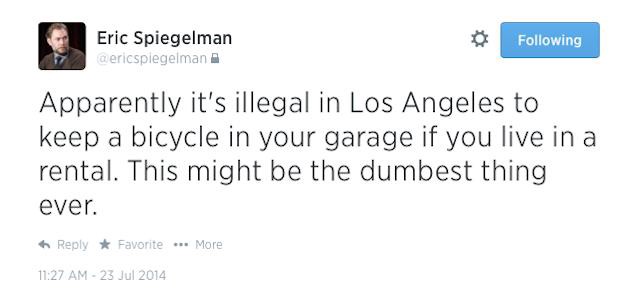
Eric! So what happened here?
A city housing inspector came by my building. I live in this fourplex, which is really two duplexes on different streets. I think what happened is that one of the tenants in the lower duplex complained to the housing department because the landlord wasn’t making repairs. I think this because he cornered me one day and told me he couldn’t turn off the faucet in his bathroom without a wrench.
When the housing inspector came he was obligated, I guess, to inspect the entire building. A few days later, I got a letter from the landlord that I needed to clean everything out of my garage, or he would throw it away for me. Something wasn’t right about this. I asked my landlord if that included my bike. He said, “What part of ‘everything’ don’t you understand?”
I called the housing department. The first woman I spoke to said the rule in Los Angeles is you can’t keep anything in your garage but a car. “What about a bicycle?” I asked. “Nope, you can’t have that.” “That’s crazy,” I said. She told me I should talk to the guy who conducted the inspection. So I went down to the local housing department office to talk to him. He confirmed that, yes, that’s the rule, and yes, it includes bicycles.
A friend I work with is a bike advocate, and I told her what was going on, and she emailed another bike advocate, who emailed people in government, and word got back to me that no law in California or Los Angeles bans keeping your bike in a garage. The actual rule is that there can’t be so much junk in a garage that a car won’t fit. I also got a copy of the order the housing department gave to my landlord.
The order said nothing about my garage. It did mention my lower duplex neighbor’s bathroom sink, however, as well as other stuff in his apartment. I emailed my landlord, and he said he knew the order didn’t say anything about my garage, but that the inspector gave him “a warning” about it.
In summary, the situation is that my landlord thinks he’s been given the authority by the city to throw away things in my garage, based on a warning from a housing inspector who misquoted the law.
Is there any way you can fight this?
Well, first, the housing inspector clearly screwed up. And my landlord, well, he obviously can’t just throw my stuff away. But I have a little bit of sympathy for him, since someone in a position to fine him gave him very wrong information. My plan is to try and get another inspector over here to confirm that I don’t have to move anything. If another inspector doesn’t get here in time, I’m going to hold my ground and probably sue if the landlord throws away my bike.
Lesson learned (if any)?
Well, I keep thinking I’m being a bit ridiculous. It’s a pretty small injustice. But it really bugs me. This is my home we’re talking about. I suppose I’ve learned that my tolerance for bullshit ends at my garage door.
Just one more thing.
I’ll let everyone know how it shakes out in the comments. I was asked to empty my garage by the 18th.
Matthew J.X. Malady is a writer and editor in New York.
Content Distributed
Content Distributed
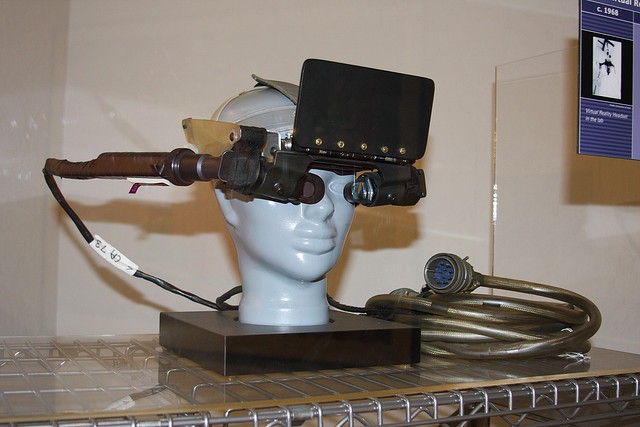
Near the end of Mike Isaac’s boldly headlined piece on the fifty million dollars that BuzzFeed has raised from the venture capital firm Andreessen Horowitz and what it plans to do with it, he notes:
And the future of BuzzFeed may not even be on BuzzFeed.com. One of the company’s nascent ideas, BuzzFeed Distributed, will be a team of 20 people producing content that lives entirely on other popular platforms, like Tumblr, Instagram or Snapchat.
Right now, “75 percent of BuzzFeed’s traffic comes from referrals from social sites.” From a publisher’s perspective, this is the ideal relationship between it and a “social site”: It plants a stick of dynamite (content) in a mountain (a social network in this dumb metaphor) and hopes it explodes, after which it can mine a precious commodity, eyeballs, which it transmutes into money. But the social sites view this relationship far differently: These “referrals,” which send users to external sites, are not a resource to be harvested, but excreta, a waste byproduct made in the process of extracting users’ attention on a weekly, daily, hourly basis. Efficiency demands that it is, in time, reduced to the minimum tolerable levels, if not outright eliminated.
BuzzFeed Distributed, from the perspective of the social sites, eliminates this waste product: It’s the beginning of an endpoint of a teleology in which web sites complete their transformation from discrete entities to mere stockers of social streams. Facebook is unmentioned by Isaac — in part, perhaps, because BuzzFeed might like to downplay its reliance on Facebook, since it’s often cited as a potential liability with respect to future growth — so a tempting, alternative way to read “distributed” might be “distributed in places that are not Facebook.” But this is clearly not the case, since BuzzFeed already produces video content that lives natively and completely on both Facebook and YouTube — with minimal exhortation to come to BuzzFeed Dot Com — where it performs staggeringly well.
“What Men Are Really Saying When Catcalling Women,” published just four days ago, has nearly a hundred thousand shares and thirty-five thousand Likes on Facebook; on YouTube, it has well over six hundred thousand views. (Indeed, BuzzFeed has noticed that certain types of videos published natively on Facebook or YouTube, depending on the audience, perform much, much better than say, videos posted on BuzzFeed Dot Com that are then shared to those platforms; BuzzFeed Distributed, to the extent that it is an experiment, is built on a hypothesis that is backed up by real, if preliminary, data.) So this is one possible shape of the end of publishing as we’ve known, maybe? A piece posted on a Facebook thing, and then on a Google thing, and nowhere else at all.
Let’s leave aside the question of where the money comes from to produce that content (Facebook will find a way, right???). One curious potential side effect is that, but for the power and wisdom of The Algorithms, the Bored Panda problem will only grow: When all content lives wholly and completely on Facebook (or Yo or Tumblr or Push for Pizza) who cares where it comes from? There’s already a certain apathy toward the origin of things — that’s how we wound up with Distractify pulling in twenty-one million uniques in its second month, Ashton Kutcher funding “fastest-growing site in the history of the internet,” and ViralNova. At least, for now, they exist as (slightly) separate entities.
What we’ll have, at best maybe, are channels in a single viewfinder, probably one owned by Facebook, sort of like the screen on the back of an airplane seat: Maybe you’ll watch the BuzzFeed comedy channel, then be shown the New Yorker reporting channel when an algorithm detects you’re feeling Ambitious or Smart, until it sees that you’re not all that engaged with the Dexter Filkins’ account of the latest skirmish in Iraq (you didn’t even look at the share buttons), so then maybe you’d like to peek the NBC Universal reality channel (you did Like Top Chef the other day) or the Vice Noisey channel for some music to perk you up since you were listening to some weird dance stuff through Spotify the other day. The future may be unevenly distributed, particularly for producers, but not for their content: it will be smoothly, cleanly, perfectly so.
Photo by Pargon
(Disclosures: The current editors of The Awl, after being bred together in a small petri dish in the back of the refrigerator that holds the cold brew at BuzzFeed, resided there for a time, producing a technology vertical from underneath a stack of seltzer cans.)
The Rich Life of the Urban Space Colonist

Bad news: Neighborhoods are dying and it’s killing us, too:
It’s a new neighbourhood, all right: less physical, less tied to place, smaller and more congenial to those on the inside, more suspicious and unyielding to those outside. What Dunkelman and Pinker want readers and policy-makers to recognize is that downside: What brings us closer to people halfway around the world also makes strangers of those next door. We willingly abandoned the bad, chafing aspect of our old neighbourly ties; we have to somehow learn to maintain the good habits of compromise and personal interaction they also gave us.
Two new books and a slew of studies claim that living lives closed off from neighborly interaction is demonstrably bad for mental health, physical health, and civic health. Terrifying, objectively! And sort of alarmingly comforting, personally. But this largely suburban story brings to mind an urban cousin — a problem that hasn’t yet had a chance to fully express itself, and one I’m not entirely sure exists. But one that I think might, soon. I’m talking about Urban Space Colonies.
Imagine a neighborhood in a major American metropolis. It is inhabited both by people and businesses, but is dense with neither. It is distant but not too distant from this metropolis’s commercial centers. It is physically blighted somehow. Maybe some big abandoned buildings, or a toxic canal. It is, or was, what would be considered depressed; in the view of this metropolis’s most recent ruler, it was seen as underutilized. So it was reconsidered and rezoned. Soon there will be expensive new buildings that will accommodate expensive new people.
These people will be special. They aren’t just affluent, they’re a new kind of affluent. Either they’re simply young and wired into the new privileges of the CYBER WORLD or they work at the companies that supply them. Some of their offices may even move to these neighborhoods, unconstrained by the old commercial order of the city.
Their influence over these neighborhoods, however, will be unexpected. Normally when new people and new money flow into an area, they displace and replace. Here they may do both things differently: These residents live on a different grid than their new neighbors, one that is now invisibly overlaid over certain large urban centers (but not yet over the suburbs). They have their own transportation system; they summon cars in minutes, which will take them everywhere for a price that is objectively high but subjectively low. They receive food in a similar way, freshly prepared and delivered in a bag, or gathered from a warehouse and delivered in a box. Shopping is a silent and stationary activity. The goods come to the shopper, even furniture, not the other way around. Labor, too, can be summoned over these networks: Cleaning, repairs. Entertainment is purely on-demand. Fresh companionship is sought through similar means — flipping through faces, algorithmically matched, all within app-car range.

With their needs and basic desires met, Urban Space Colony residents will demand very different things of their physical surroundings. They won’t need stores, and the ones they want will be novel and luxurious (they will exist as a reminder of shopping, as a diversion, not as a part of the area’s infrastructure). They won’t need restaurants or grocery stores, and the ones they want will be specialized and expensive luxury experiences, meant to be enjoyed in the company of other Colonists. They will want nightlife, and they will want it to be tailored and convenient to them. The physical economy that the presence of an Urban Space Colony creates will be flimsy, minimal, deliberate, and tilted toward leisure. Any “delights” it can not support will be supplied by travel, which Urban Space Colonists enjoy constantly — there are similar sister Colonies all around the country and the world. The area surrounding the Colony may not price out the previous residents directly, in part because the Colonists build tall, but it will not meet their basic needs. It will wither. The Colonists will not be any kind of neighbor; they will not necessarily know each other. There will be, in effect, no remaining neighborhood at all.
In Alfred Bester’s 1956 novel Tiger! Tiger!, the world has been reshaped by a newly discovered human ability to jaunte — instantaneous teleportation by sheer force of will. Work and home may be remote from one another. Your office in Chicago may as well be next to your house in Green Bay. The ultimate display of wealth is to move from one place to another under your own locomotion. It is a novelty.
In Bester’s world this change has consequences for both the ultra-rich and ulta-poor; grift, on both ends of the spectrum, becomes much easier. In the real, near-future version of this scenario, however, shedding physical context is a costly privilege. The summoning is expensive, of course, as are the affected tributes to the old ways (“going to the shop” is now an activity, not a necessity). So is the real estate: This on-demand meta-economy can only exist, for now, where there is a sufficient density of humans and capital. It can exist, for example, in New York.
Images via Curbed
